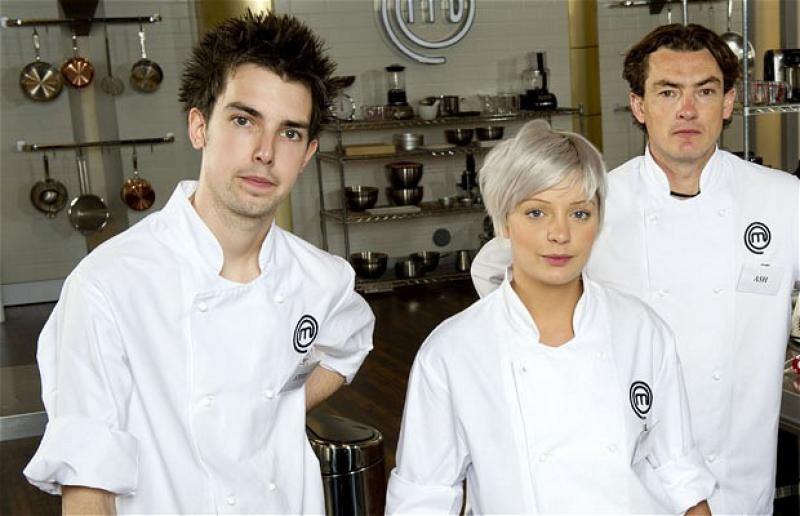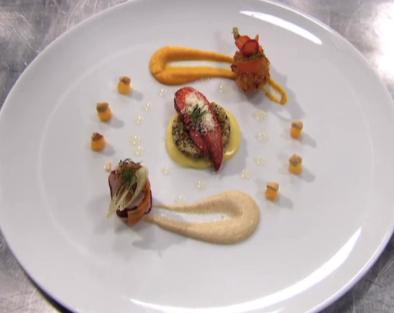


There are all sorts of reality shows, but the best ones really do strip people bare. It’s the reason why The X Factor is more interesting than Strictly Come Dancing, why Don’t Tell the Bride is more revealing of the gamble of love than Snog, Marry, Avoid? It’s the reason why Masterchef: The Professionals is more gripping than the estimable Great British Bake-Off.
While it’s cheering to see talented amateurs like you and me win the original Masterchef, the most popular in the franchise, it’s far more exciting to see the culinary genius that so many college-trained chefs, beavering away in the noisy obscurity of kitchens all over Britain, uncover in the Professional version. No year has had more edge-of-seat thrills than this year’s, despite a long slow burn over 24 episodes, which ended last night with a win that to my mind states that something more profound, more theatrical, more about the art of creating joy than just eating well is going on in British cooking.
The paradox is that you actually can’t taste the food in Masterchef. It’s like discussing painting on the radio - an act of breathtaking cheek. Because even when plates are offered dressed with a visual artistry that miraculously crosses Jackson Pollock and Richard Dadd, what actually counts is entirely out of reach of the TV audience - taste, flavour, aroma, temperature.
 This means the judges need exceptional selecting. Competing in dodgy superlatives may pass for the normal Masterchef, but for The Professionals - with a final in which they cook for 34 3-star and 2-star chefs - there comes the tranquil pleasure when chief judge Michel Roux Jr, patron of Le Gavroche, has passed through the patronising whirlwind of “exceptionals” and “sublimes” and reaches the sincere accolade of “this is very good cooking”, one master to another.
This means the judges need exceptional selecting. Competing in dodgy superlatives may pass for the normal Masterchef, but for The Professionals - with a final in which they cook for 34 3-star and 2-star chefs - there comes the tranquil pleasure when chief judge Michel Roux Jr, patron of Le Gavroche, has passed through the patronising whirlwind of “exceptionals” and “sublimes” and reaches the sincere accolade of “this is very good cooking”, one master to another.
That happened several times in last night’s final, when three cooks of evidently stupendous talent competed for the title. All of them were what some might call in today’s hokey-academic climes underachievers. Two started in kitchens from 15 or 16, another drifted into it at 19. One learned as a tot from his grandma, another would get her brother to pay her to make family breakfast, the third grew up in the Tasmanian bush eating veg from his family garden. All three had Roux speechless at times, and dimpled über-grocer Gregg Wallace rolling in the lard of his own clichés. All three drew plaudits from the roomful of multi-starred masterchefs, memorably pared down to the envious basic, “If you cook like that in a restaurant, you’ll be busy every day,” from one of them.
That elite chefs' gathering generally challenges Masterchef finalists to recreate Michel Roux recipes - it was his honest and likeable tribute to the quality of this year’s finalists that he handed the menu to them. They faced the fire of the chefs, and of the TV cameras, with such insistent modesty that I could believe the dominant qualities in top chefery are not the Ramsay wideboy raucousness or rude superiority of Marco Pierre White, but temperateness, courtesy, and a scrupulous eye for the culinary X factor that humbly seeks the ultimate judge: the public out there.
With so much excellence participating, the joy of this year’s programme is that while superlatives have been worked long past their bedtime, it’s somehow conveyed the duende of great eating, the sudden flaring of memory, association, discovery, surprise that makes something you see and munch tap into another layer of your being.
Ash Mair apparently put such emotion and narrative personality on his plate that you could taste it
While Steve Barringer, the extraordinary 25-year-old from Bedford, has “a glittering career” ahead, said Roux, producing plates of beauty that, if put in a glass case, art collectors might bid millions for, and platinum-haired Claire Hutchings, the even more prodigious 22-year-old Brummie, has a palate of marvellous originality and bollocks of steel, the much older Ash Mair apparently put such emotion and narrative personality on his plate that you could taste it. Michel Roux’s dissection of his eye-wateringly beautiful lobster salad (pictured above right) on Wednesday night [3]was a masterclass in fastidious appreciation that a critic in any discipline could learn from, from scrupulous assessment of individual ingredients to the life-enhancing overall experience. "It's so pretty, it hurts," he summed up feelingly. Even better, all the recipes can be found on the BBC website [4].
On an entertainment level too, this show over four years has matured from professional interest to telly compulsiveness. TV has revealed Monica Galetti, Roux’s exacting lieutenant, as a natural star, outclipping Simon Cowell by several chilly notches, but more intriguing and discreet stars are the restaurant chefs with whom, thanks to Roux’s reputation, the finalists have cooked. Glorious filming has turned kitchens into wizards' caves where sugar is blown into glass, olive oil bubbles float on lakes of translucent purées, and boil-in-the-bag rises to a 3-star technique. But all paled by comparison with the baptism-by-witchy-fire for the three finalists in the fabulous El Celler de Can Roca [5] in Girona, run by three incredible brothers. The food we saw them make made you shake your head in disbelief, at such extreme epicureanism, such magical imagination, yet with so much fun and rustic verve.
In this final, one sensed that a line has been crossed: with Ash, Steve and Claire, as Roux said, the future of British cooking is in incredible hands. Industry saved, then, as well as grand TV.
Links
[1] https://theartsdesk.com/users/ismene-brown
[2] https://www.addtoany.com/share_save
[3] http://www.bbc.co.uk/iplayer/episode/b018j73v/MasterChef_The_Professionals_Series_4_Episode_23/
[4] http://www.bbc.co.uk/food/programmes/b018j7fq
[5] http://www.cellercanroca.com/PORTADA/intro_2.htm
[6] http://www.amazon.co.uk/s/ref=nb_sb_ss_c_1_10
[7] https://theartsdesk.com/node/3100/view
[8] https://theartsdesk.com/node/2036/view
[9] https://theartsdesk.com/node/19399/view
[10] https://theartsdesk.com/node/15414/view
[11] https://theartsdesk.com/tv
[12] https://theartsdesk.com/topics/australia
[13] https://theartsdesk.com/topics/reality-tv
[14] https://theartsdesk.com/topics/bbc-two
[15] https://theartsdesk.com/topics/food
[16] https://theartsdesk.com/topics/reviews